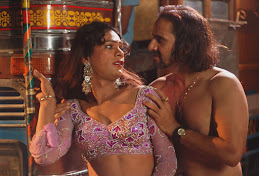 Sridhar Rangayan with Naseeruddin Shah & Dr.Jabbar Patel
Sridhar Rangayan with Naseeruddin Shah & Dr.Jabbar PatelReport: Roseliz Francis
'Contemporary Indian Cinema - Challenges and Prospects' was the theme of the second edition of the Open Forum of the 12-IFFK. the panelists were veteran Indian actor Naseeruddin Shah, noted Filmmakers Jabbar Patel, P.T.Kunjumohammed and Sridhar Rangayan, and the moderator was Unnikrishnan B.
Naseeruddin Shah felt that the conundrum of what exactly is 'Indian' was the real bone of contention. He stated that contemporary Indian cinema was synonymous with Bollywood and this was not a positive trend. While the films from the other regions of India were isolated he predicted that the fascination with these clichéd 'song and dance sequences' would soon die out.
Noted filmmaker Jabbar Patel opined that it was the content of Indian cinema accessible to the world that should be focused on. he added it was the onus of the upcoming filmmakers to create meaningful cinema as against mainstream Bollywood cinema. he said that 'Middle Cinema' will continue the new wave generated by parallel cinema earlier on. Parallel cinema lacked genres while gaining expertise on specific themes. Middle cinema will transcend these limitations.
Sridhar Rangayan gave an overview on the struggles of 'underground'/'queer' film makers to deal with contemporary themes. Though the digital trends were a boon, he said production and distribution expenses and censorship have curtailed the wings of the new age Indian film makers.
P.T.Kunjumuhammed said how it is an inferior mindset that has caused many a regional film not reaching a global audience.
Source: Official Bulletin for IFFK 2007, Dec 10.



















